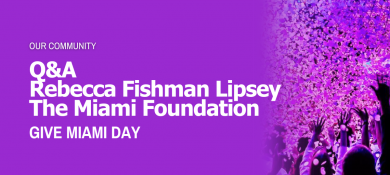Heat title runs offers lessons for Miami
BY TADD SCHWARTZ

July 2010 marked a low point in Miami’s recent past. From an overzealous Miami Heat team, to an overhyped real-estate market, the Magic City struggled to regain its stride following a period of sustained growth through the 2000s.
You wouldn’t have known it if you were inside AmericanAirlinesArena when the Miami Heat — fresh off the news that The Big Three were headed to town — hosted an over-the-top arrival party complete with fireworks and bold predictions of league dominance.
The hoopla surrounding the team recalled the previous decade’s go-go days, when dozens of cranes dotted the Miami skyline, joblessness was minimal, home prices skyrocketed, speculative buying fueled the condo market, and each month brought a new hotel opening in downtown or South Beach.
But conditions outside the arena in the summer of 2010 painted a far different picture.
The unemployment rate hovered above 12 percent, among the nation’s highest, with little improvement in sight.
South Florida’s residential real estate market was home to the second highest number of foreclosures in the country and condo prices were down 20 percent.
Commercial real estate also lagged, with demand for office space at historically low levels just as the market welcomed millions of square feet of new product.
Year-over-year trade volume in South Florida was off 15 percent versus 2009.
Miami’s hospitality sector suffered too, with hotels experiencing a 20 percent drop in average revenues per room amidst a slumping economy and gushing oil spill to our west.
Questions lingered about the viability of our arts landscape; financing for the construction of Miami Science Museum and Miami Art Museum in Museum Park remained uncertain.
The Miami Heat’s heartbreaking loss in the 2011 NBA Finals added insult to injury and, in hindsight, it proved to be a fitting symbol of the community’s vulnerability.
What a difference two years can make.
Fast-forward to today and Miami is beating expectations, having effectively bounced back from the depths of 2010.
Our unemployment rate is back in the single digits and headed in the right direction.
Residential real estate is regaining strength, buoyed by rising home prices and 90 percent-plus occupancy rates in the urban core’s condominiums.
The commercial sector is finding its footing again, with positive absorption returning to the office market, record-levels of demand for industrial and retail space, and investment pouring in from Asia, Europe and Latin America to the tune of billions of dollars.
South Florida has recovered most of its recessionary trade losses to regain a spot in the top-ten Customs Districts nationally, with further growth expected as major infrastructure enhancements at our airports and seaports come online.
Miami’s hospitality market is improving as well, with overnight tourist stays up nearly 7 percent over 2010 levels, visitor spending more while here, and the hotel sector seeing increases in occupancy, room rates and revenue per available room.
Museum Park is rising as nonprofit cultural institutions like the Adrienne Arsht Center and New World Symphony draw an average of 13.5 million patrons and generate more than $1 billion in impact annually, according to a new study by Americans for the Arts.
And to top it off, the Miami Heat’s Big Three are the rightful owners of the NBA Championship trophy for the first time in what may very well become a multi-year dynasty.
Miami, like its basketball team, is at the top of its game.
We are emerging as a global destination for tourism, business, arts and culture, finance, entertainment, and more – reversing the long-held notion that Miami boasts little more than sun and surf.
Getting here was not easy. Miami has overcome negative public perception and suffered its share of setbacks in recent years, but we have demonstrated adversity, gaining acclaim as one of the world’s most dynamic and fastest-growing cities.
Maintaining this momentum will require collective humility and smarts, both in terms of where and how we deploy our community’s chief assets.
If this recipe for success sounds familiar, it’s because we just witnessed a similar path to victory play out on the hard court. Now, if only we could borrow Coach Spoelstra’s playbook.
Tadd Schwartz, a Miami native, is the founder and president of Schwartz Media Strategies.




 See More Blogs
See More Blogs
Comments